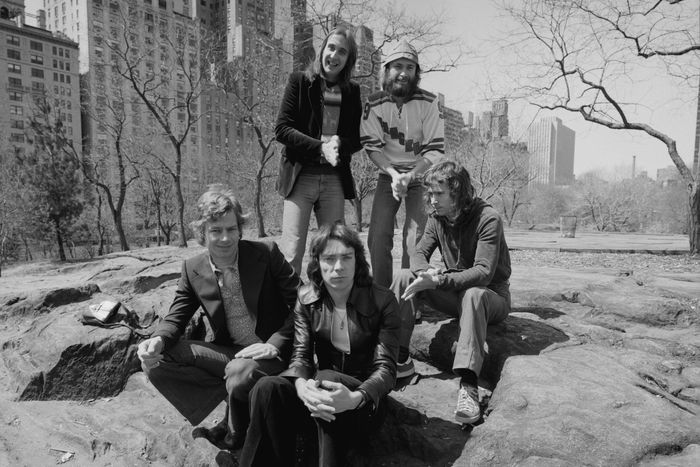
In 1974, Genesis released their progressive rock opus The Lamb Lies Down on Broadway, the lyrics of which were written entirely by front man Peter Gabriel before he left the band to pursue a solo career. A concept album that follows a young man named Rael as he comes of age in New York City, the record features enduring songs such as “The Carpet Crawlers” and the titular track, both of which remained concert mainstays for Genesis up until their final show. However, the lead single that was selected was “Counting Out Time,” a decision that still baffles guitarist Steve Hackett decades later. (The lyrics, about erogenous zones of a woman, would weirdly foreshadow one of Friends’ most famous scenes.) Hackett, whose new album The Circus and the Nightwhale is out now, tells Vulture about how the “Counting Out Time” debacle and its “obvious concession to commerciality” accelerated his growing problems within the band.
Peter Gabriel left the band before The Lamb Lies Down on Broadway. He was going to work with William Friedkin, who wanted him to write a screenplay. Pete was having difficulty squaring away the band and his marriage and the fact that his wife had a child after a difficult birth. He saw Hollywood opening up for him. Now, as soon as William heard that Peter had left, he was horrified. He didn’t want to break up Genesis. So at the point we were thinking, Well, who else are we going to get as a lead singer? A few days later, we heard Pete would be prepared to come back, but on his own terms. For the next album, he wanted to write all of the lyrics and didn’t want to sing anyone else’s. He was dictating terms to a band that had functioned more or less as a democracy.
“Counting Out Time” was about a first sexual encounter and all that comes with that — doing it by the book as if there was a manual for that sort of thing. I think the song was very much a one-trick horse, whereas “The Lamb Lies Down on Broadway,” as the opening song, might’ve made the better single because there’s more depth to it. The narrative is there. It’s more grown-up. I think the portrait of New York, albeit in a very surrealist kind of way, was far more complete. “Counting Out Time” was very much a joke or a novelty single. It’s almost like Benny Hill put to music. It didn’t quite make it as a single, and nobody was surprised, least of all me. I couldn’t see it becoming a hit. It didn’t have the depth of “Stairway to Heaven” or even any of the Tommy songs from the Who. It was an adolescent song or a song about an adolescent, and that’s very difficult to find an audience for, because the adolescent isn’t going to understand it and those who are grown-up are either going to get the joke or not.
I understand the record-buying public’s complete rejection of that. The band was kind of a runway train at this point. It was pulling in at least two different directions: You had Peter’s direction, and then you had the direction of the rest of us, who were instrumentalists. Phil Collins was very much number two in the vocal department, although he had a great voice. I think the word aberration comes to mind. “The Carpet Crawlers” was released as the second single and I’m glad it was. That seems to be the standout song that makes grown men weep in bathrooms when they’ve just heard it. There’s something about it that speaks to people, even though it’s not obvious. I wonder what it is they see in it.
The whole concept was Peter’s swan song with the band. By the time he was working on his own music and able to do “Solsbury Hill,” that was much more of a contender for success. It still gets played every day on the radio. But in order to achieve that, he had to be functioning as a solo act and leave us behind. There were no passengers in the band, but there wasn’t necessarily room for everybody on that train.


